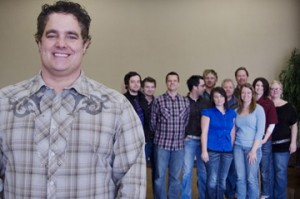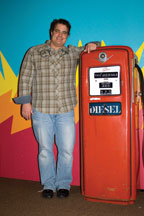
By Ronald E. Keener
This pastor says a red-hot marriage is a must for being an effective rural pastor.
Ever tempted to think “we’re just a country church of 30 souls, we’ll never grow much larger”? Or you’ve thought, “There’s no way we will ever see our church at 3,000 people.” Don’t tell that to Shannon O’Dell, senior pastor of Brand New Church in the small, rural church of Bergman, AR.
 O’Dell tells about his experience of raising up a church of 30 to 3,000 over just six years in Transforming Church in Rural America: Breaking All the Rurals (New Leaf Press, 2010). He talks about “the rules” about the rurals — “the unspoken but clearly understood values that permeate American Christianity’s beliefs about churches in the boonies.” Bottom line, he says, is “forget the rules.”
O’Dell tells about his experience of raising up a church of 30 to 3,000 over just six years in Transforming Church in Rural America: Breaking All the Rurals (New Leaf Press, 2010). He talks about “the rules” about the rurals — “the unspoken but clearly understood values that permeate American Christianity’s beliefs about churches in the boonies.” Bottom line, he says, is “forget the rules.”
Church Executive shared some questions with Pastor O’Dell:
Describe the area in which the church is located; what is “rural” about the area?
Bergman, AR, population 407, just got a Dollar General! There are no major employers in this town, but a great school and wonderful people. The Klu Klux Klan is headquartered just a few miles from our campus, but has no impact on slowing down the love of God to every race in our community.
You write, “they (the congregation) hired me thinking they wanted change, but they really didn’t. They wanted to be engaged to change and stay married to their tradition.” What event or occasion made that crystal clear to you?
We needed space to grow our student ministry and we voted to move the pews if the ministry grew to 60 or more students. It grew, the pews came up, and 11 families left with their pews.
You also write, “I began to realize that many struggling rural churches don’t want a real pastor to lead them; they just want a pacifier to nurse them through the years.” If you were advising a pastor interviewing with a rural church, what would you have him ask to be sure he and the church were on the same wavelength about change?
Make sure you understand the bylaws. Be confident that your vision has a chance to fly.
What caused the “mass exodus” from South Lead Hill [the former name of the church], what you called the “the first real cut of rejection, the shedding of the first drops of the blood of failure?”
When we changed the bylaws and removed the pews.
What is “sacred cow-tipping” in a church like your own? How can one identify those things in advance, other than through hard experience?
Ministry is war and not all is enemy fire.
What is the price one pays to pastor a rural congregation?
The cost is great. You don’t have leadership quotients, financial quotients or Outback Steakhouse like most metro areas.
What kind of governance should a church have? Is it possible to be too democractic?
Biblical governance is key and it’s all found in Acts. God is a Theocracy, not a Democracy. God works through revelation and leadership from the called, appointed and anointed.
Talk about intentionality in ministry. You’ve said, “If things were to change, we would have to be intentional, and God would have to be faithful.”
You move, God moves — Moses to the burning bush. We draw near, God draws near; fisherman to Jesus in Mark 6. All of God’s power awaits us, so go for broke.
There are a lot of pastors in churches under 100 members across this country. What few things should they do today to be intentional about growth? What discussions should they be engaging their board in at the next meeting?
Growth is three things: Passionate about winning souls, Essential doctrines, Fluidity. How can we get more to attend our building?
What do we need to undo? Look at “real” numbers.
Before taking the job you threw out nine fleeces, expecting them to be rejected. Is throwing out a fleece biblically sound; when should it be used?
The ultimate fleece is The Word. Fleeces are in the things you cannot answer clearly.
What do you mean about the need for “a red-hot marriage” being a must for being an effective rural pastor?
The lost, over-churched, and de-churched in rural America do not know what to do with a marriage that is made up of two lovers. Your marriage is a mirror image of your walk with Jesus. If it’s hot, so is your walk with God.
Who came up with the name of Brand New Church; it’s “raising a lot of eyebrows.” What were you trying to do with that?
We wanted the world to know that you are brand new in Christ every day. Col 3:10: “In its place you have been given a brand new nature that is continually being renewed.”
 Tell me about “conflict as the norm” that seems a part of church life. What is your perspective on conflict in successful ministry?
Tell me about “conflict as the norm” that seems a part of church life. What is your perspective on conflict in successful ministry?
Sharpening takes friction. Change, conflict, then growth is a natural progression in all growing churches.
Did you always have a majority of your board behind you, or a particular leading layman, and therefore had that insulation against being fired for your moves?
No, growth prevents firing. Also, our bylaws prevent much of what we know as pastoral firings.
What’s the “massive drought” you speak of in rural America? What kind of leadership does the church of Christ require that it isn’t getting, in rural America or elsewhere?
Leadership drought. Calling drought. We need vision and excellent teaching in this part of the world.
Who was the pastor of your youth, and what is your conversion story?
At the age of 9, I was regenerated, because a lady named Martha invited my family to church. I have never been the same!
What keeps you humble? Who has humbled you in this ministry? In a pastor-led church, what are your touchstones to reality — other than your wife?
God’s Spirit is daily challenging me. Failures keep me humble. We have extreme financial checks and most ministry taking place I have no idea about it.
Today, what ministries and initiatives are you most pleased about in the church? iCampus, and the like?
I’m very pleased with our multisite approach, and our financial infrastructure. I’m very happy with our teaching series topics.
A merger with another church made a lot of difference to the growth of your congregation?
Merger allowed us to save money and continue to grow. We need to be sensitive to all opportunities to grow. Merger is one of many ways to build.
What do you advise about a church’s outreach in the community?
Reach the poor and the widow. Nothing rings the bell of ministry louder than reaching families with food and clothing. www.BrandNewChurch.com
_________________________________________________________________
 Four our new rules about rural
Four our new rules about rural
- Small doesn’t mean boring.
- Rural doesn’t have to mean a lack of innovation.
- Excellence is not found in the detail or design of a building.
- Success is not found in the building’s size.
From Transforming Church in Rural America by Shannon O’Dell (New Leaf Press, 2010)



I also heard that O’Dell had hundreds of thousands of dollars to use to grow the church. Is that true? I am the pastor at a slowly growing rural church who is always financially strapped, but I think it would be a lot easier to grow with that kind of money.